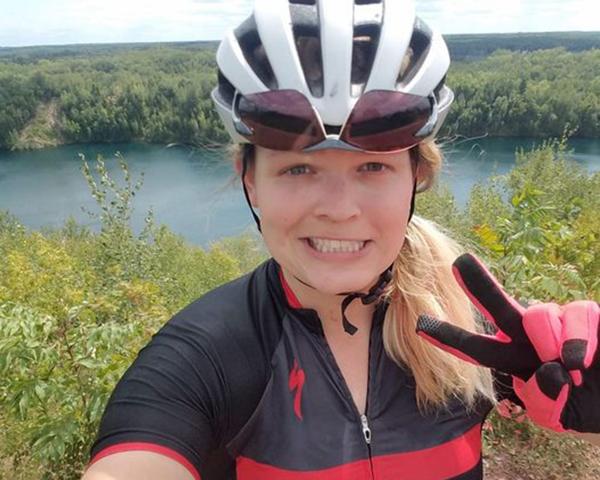Ready to roll: Bicycle Assembly and Repair Program
Casey Coughlin, the first instructor for the new Bicycle Assembly and Repair Technician Certificate program, grew up in Brooklyn Park, Minnesota, taking bicycles apart in her garage and putting them back together.
“I spent most of my childhood on a bike — raced dirt track BMX for fun,” Coughlin said. “I took bikes apart to see if I could put them back together. Looks super simple, but it’s not. Eventually you’re able to figure it out. I get great satisfaction of taking things apart and putting them back together.”
Minneapolis College Academic Dean of the Schools of Trade Technologies and Business and Economics Vincent Thomas said, “Our students will benefit from Casey’s combination of bicycle industry experience with Erik’s Bikes and Teaching Assistant experience at the University of Wisconsin-Eau Claire.”
Thomas said certification from one of only two post-secondary bicycle technician programs in the country is completed in two 12-week semesters, enabling students to finish and be hired before the start of the local bicycle industry’s busy season in April. Plans call for a cohort of 24 students to start the certificate program every Fall Semester. The first semester starts Monday, September 20.
“Graduates will be able to work on any and all bicycles you find in America or abroad,” said Coughlin. “They will be able to pick up a wrench and work on any bike in any shop.”
Certification courses will include lectures and labs.
“The course takes place inside the bicycle laboratory, which effectively is a bike shop with no customers so students will not be surprised by how bike shops are set up,” said Coughlin. “Much of it is going to be a hybrid lecture-lab because it’s very difficult to explain in words to somebody how a rear derailleur — the device that moves the chain from cog to cog on the gears in the back wheel when one shifts — works.
“But it’s also equally difficult to hand somebody a rear derailleur and ask them to figure it out. A combination of a fast back-and-forth between explaining, lecturing, describing properties on how something works, and turning around and getting your hands on it and feeling how it works. The method of installation and repair becomes intuitive.”
Thomas and Coughlin said Minneapolis College is launching the program in collaboration with the Bicycle Industry Employers Association (BIEA), a national non-profit organization created to establish collegiate-level programs that educate students for careers in the bicycle industry. Dave Olson, CEO of Minneapolis-based Erik’s Bikes, serves as Chair of BIEA’s all-volunteer Board of Directors.
“Graduates of the program gain access to the BIEA job board, sequestered for them and password protected,” Coughlin said. “Only members of BIEA can post on the job board. All the jobs have a base salary of $32,000. This will improve the professionalism of bike mechanics and allow entry level mechanics to make a lot more money than if they walked in off the street. They will have a higher skill level, earn a higher wage and produce a higher value for the shops.”
The new repair technicians will increase the diversity of the industry.
“The cycling industry is very white and very male,” Coughlin said. “Hopefully, this certificate can be a stepping stone in the direction of increased diversity in the cycling industry. If you want to learn to fix a bike professionally, you must get hired at a bike shop. I know this is not the easiest thing to do if you are not what bike shops think a bicycle technician is supposed to look like. Having a program separated from the industry allows people to opt into learning how to fix bikes because they want to, not because the owner of a bike shop thinks they look like a bike mechanic.”
Coughlin received an English degree at Eau Claire and was on track to enroll in graduate school to earn a Ph.D. in English Literature.
“Because grad school was so expensive, I got a job in 2015 at Erik’s Bikes in Rochester to save money to try to get into grad school,” Coughlin said. “Erik’s turned out to be a fun and satisfying job repairing bikes. I became a service manager and then a store manager.
“I grew up in a garage working on family and friends’ vehicles. Intuition as a mechanic came naturally to me. That, coupled with the professional training that was available and was provided to me at Erik’s really accelerated my growth as a bike mechanic.”
Until accepting the opportunity at Minneapolis College, she managed training and field support for eight Erik’s stores.
“Working at Erik’s turned out to be much more interesting work,” she said. “There is something deeply satisfying about working on a complex mechanical system with a bunch of different mechanical parts that work together like a symphony. Fixing it is fun, and it’s great to have a job that is fun.”
The passion to teach is evident. “I’m very excited to help students understand the how [and] why something works, the principles behind it, the fundamentals and concepts so they can reach conclusions on their own and develop skills to critically solve problems on a bike rather than by rote instructing on how to adjust a rear derailleur.”
When she’s not in the classroom or in the bike shop, Coughlin enjoys road biking, travel biking, and “a lot of mountain biking. I raced in the velodrome in Blaine before it was torn down.”
